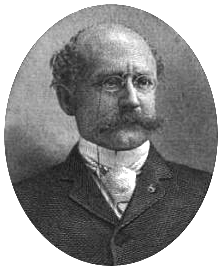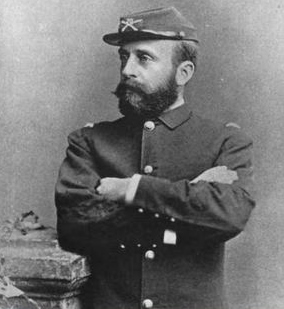
Henry Harrison Bingham was an American politician from Pennsylvania who served as a Republican member of the U.S. House of Representatives for Pennsylvania's 1st congressional district from 1879 to 1912. He was a Union Army officer in the American Civil War, fought in some of the key battles of the war and received the United States Military's highest award for valor, the Medal of Honor, for his actions at the Battle of the Wilderness.

Richard Conner was an American Civil War Union Army soldier who received the Medal of Honor for his bravery in action.
Pinkerton Ross Vaughn, Sr. was a United States Marine Corps sergeant during the American Civil War. He was awarded the nation's highest military decoration for valor—the Medal of Honor, for his actions aboard the USS Mississippi during a battle with Confederate artillery batteries at Port Hudson, Louisiana on March 14, 1863. Vaughn is one of the first two Marines to be awarded the Medal of Honor in the history of the Marine Corps.

Edward Bancroft Williston was a brigadier general in the United States Army. He was a recipient of the Medal of Honor for gallantry during the American Civil War.

St. Clair Augustine Mulholland was a colonel in the Union Army in the American Civil War who later received the brevets of brigadier general of volunteers and major general of volunteers and the Medal of Honor for gallantry in action at the Battle of Chancellorsville.

Sylvester Bonnaffon Jr. was a United States soldier who fought with the Union Army during the American Civil War as a first lieutenant with Company G of the 99th Pennsylvania Infantry. He received his nation's highest award for valor, the U.S. Medal of Honor, for his gallantry and leadership against Confederate troops during the Battle of Boydton Plank Road, Virginia on October 27, 1864. That award was conferred on September 29, 1893.

Henry Rodenburg was a United States Army soldier who received the Medal of Honor. His award came for gallantry in the Indian Wars.
Joseph A. Cable was a United States Army soldier during the American Indian Wars who received the Medal of Honor for his actions at Cedar Creek, Montana and other campaigns.
Aquilla Coonrod or Coonrad was an American soldier in the U.S. Army who served with the 14th, 48th and 125th Ohio Volunteer Infantry during the American Civil War, and with the 7th U.S. Cavalry and the 5th U.S. Infantry during the Indian Wars.
Denis Byrne was an Irish-born soldier in the U.S. Army who served with the 5th U.S. Infantry during the Indian Wars. He was among the 31 soldiers who received the Medal of Honor for during General Nelson A. Miles "winter campaign" against the Sioux Indians in the Montana Territory between October 1876 and January 1877.
Edward Johnston was an American soldier in the U.S. Army who served with the 5th U.S. Cavalry during the Indian Wars. He was one of thirty-one men received the Medal of Honor for gallantry during General Nelson A. Miles winter campaign against the Sioux in the Montana Territory from October 21, 1876 to January 8, 1877.
Private Christopher Freemeyer was a German-born soldier in the U.S. Army who served with the 5th U.S. Infantry during the Indian Wars. He was one of thirty-one men who received the Medal of Honor for gallantry during General Nelson A. Miles campaign against the Sioux Indians in the Montana Territory from October 1876 to January 1877.

Daniel P. Reigle was a Union Army soldier during the American Civil War. He received the Medal of Honor for gallantry during the Battle of Cedar Creek fought near Middletown, Virginia on October 19, 1864. The battle was the decisive engagement of Major General Philip Sheridan’s Valley Campaigns of 1864 and was the largest battle fought in the Shenandoah Valley.
Private Thomas W. Stivers, also known under the name Thomas "Tom" Stevens or Stevers, was an American soldier in the U.S. Army who served with the 7th U.S. Cavalry during the Great Sioux War of 1876-77. One of twenty-four men to be awarded the Medal of Honor for gallantry at the Battle of the Little Bighorn on June 25, 1876, Stivers was among the soldiers who volunteered to carry water from the Little Bighorn River to the wounded on Reno Hill and awarded the Medal of Honor in 1878. He and two other fellow Kentuckians, Privates William M. Harris and George D. Scott, received the MOH for their role in the battle though Stivers received his posthumously.
Albert Glawinski was a United States Army soldier who received the Medal of Honor. His award came for gallantry during the American Indian Wars.

John Mitchell Vanderslice was a United States soldier who fought for the Union Army during the American Civil War as a member of the 8th Pennsylvania Cavalry. He received his nation's highest award for valor, the U.S. Medal of Honor, for being the first man to reach the rifle pits of the Confederate States Army during a charge made by his regiment on CSA fortifications in the Battle of Hatcher's Run, Virginia on February 6, 1865.

Myles Moylan was a United States Army officer who fought at the Battle of the Little Bighorn and received the Medal of Honor. His award came for gallantry during the American Indian Wars.
Musician John Baker was a soldier in the United States Army and a recipient of the Medal of Honor.

Matthew McClelland was a United States Navy sailor and a recipient of the United States military's highest decoration the Medal of Honor for his actions in the American Civil War.

Axel Hayford Reed was a Captain in the United States Army who was awarded the Medal of Honor for gallantry during the American Civil War. During the battles at Chickamauga, Georgia and Missionary Ridge, Tennessee on 19 September and 15 November 1863, respectively, Reed voluntarily left his position in the rear of the army to engage the Confederates. He was later severely wounded while leading a charge against Confederate positions.











